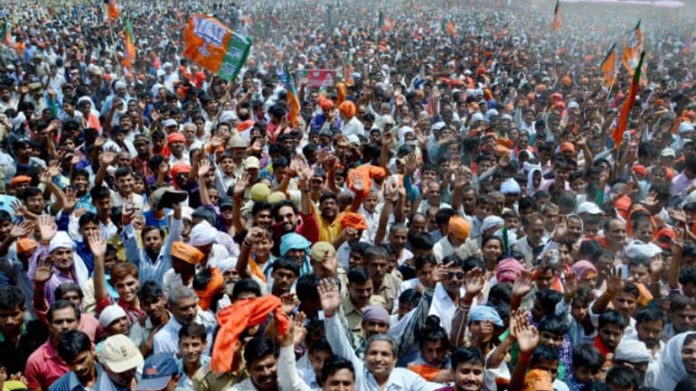This article is written by Meera Patel from Maharaja Sayajirao University, School of Law, Vadodara. This article throws light on the filthy side of politics.
Table of Contents
Introduction
When we hear about politics, the first thing that comes to a person’s mind is usually the government or a political party or a politician for most of it. The objective behind this association is that every country needs a centrally administered institution to keep the country in a check and to maintain uniformity. This whole process of acquiring that government organization is where the politics come in.
The reason behind why we keep denoting politics as ‘filthy’, ‘dirty’, and ‘negative’ is because of the politicians. In reality, politics isn’t dirty. It is an abstract reality. The politicians are the dirty players of this so-called dirty game.
The reason why politics is indistinguishably connected itself to a permanent negative connotation is that the indistinguishable power given to the political leaders, or the people who can abuse those powers.
The idea of dirty politics does not only revolve around corruption but also includes nepotism, favouritism, bias, seeking personal vendetta because of the power in one’s hands, etc.
This article throws light on the reasons, controversies, and the laws related to this game known as dirty politics.
History of dirty politics
India was a rich country back in 1983 but she was considered rich because of her potential natural resources and mineral wealth but if we juxtapose this situation, we can say that even if India was rich in one way, she was still considered as a poor country because of her low per capita income and low Gross Domestic Product
After draining India’s resources, the Britishers left India after 200 years. Over the 200 years, it was established that India was neither geopolitically sound nor a homogeneous cultural hub. Therefore, the noticeable shift of cultural influence introduced the concept of corruption in India and it divided the already fragmented India into various smaller parts. These small kingdoms of India became the prey of corruption, thus, giving it a chance to embed the virus of corruption in India.
After World War II, the Britishers left India while leaving exhausted India back to its patrons. Jawaharlal Nehru took the reins in his hands and became the first elected prime minister of India and to avoid the horrors of wester Influence, the government decided to take up the Eastern Socialist ideology for our economy over the Western Capitalist ideology. Even though our economy is described as a mixed economy, the main idea revolved around the socialist economy.
Our economy was built up at a rather slow speed than anticipated and thus, the government got powers to monopolize the controls over these decades due to which the economic growth reduced a lot resulting in hyperinflation.
Reasons behind the spread of dirty politics in India
Corruption has established its roots so deeply in India that it would take many years to pull it out of its roots before India can be called a non-corrupt country. As mentioned above, in 2005, the Corruption Perception Index ranked India on the 90th rank out of 180 countries but in the year 2019, the Corruption Perceptions Index by Transparency International has ranked India in the 80th position indicating a steady decline of corruption since 2005.
This index provides the services by collecting data to rank countries based upon how corrupt the public sectors are.
Corruption in India is one of the main issues that a democracy needs to tackle if it wants to stop the negative side effects of corruption projected on the economy and the development of the state, central and local government in various ways.
According to the Corruption Transparency Index, in 2005, 62% of Indians had bribed or paid a bribe in a way to get public actors to do a personal favour.
Along the lines of all this, various other activities stole the limelight too. These activities were played on the political playground which was the reason behind the tainted political system we see today. Such examples are:
- Stealing of ballot boxes;
- Coerced and intimidated votes;
- Excessive money spending than the required amount;
- Generation of wrongful voter IDs;
- Selling votes to the poor classes of India;
- Production of black money by taking funds from the rich;
- Disinformation;
- Misuse of proxy votes during elections.
The already corrupt government tainted the economic growth of India because of various reasons.
- Decreased wages of the government employees;
- Complicated tax system;
- Convoluted licensing system;
- An opaque and unaccountable administrative system;
- Immoderate regulations;
- Lack of equal opportunities;
- Monopoly of the government;
- Outdated legal system;
- Opaque laws.
In 2005, India was ranked 90th out of 180 countries on the ‘Transparency International’s Table of Perception of Corruption Index’
This proved that all the activities in India included the misuse of all the public goods, property, and services to pocket all the benefits. This misuse of public property ranges from public money embezzlement to abuse of power which also includes bribery.
In the past few decades, India has lost a lot of important assets which include:
- India was called the ‘golden bird’ or ‘sone ki chidiya’ before she achieved independence has now lost its economic luster
- The second-largest populated country suffers from large scale youth unemployment
- Crumbling political rights
- Transparency and accountability of the government and the laws
The largest contributors to our corrupt country are:
- Entitlement programs;
- National spending schemes;
- India’s trucking industry for money smuggling as the truckers are forced to pay billions of rupees in the form of bribes per annum to various regulatory police stops on interstate highways;
- Stashing millions in international bank accounts especially the Swiss bank accounts.
This problem has made serious bumps on the path of protecting the rules, laws, and secure access to justice. Various famous scams that are connected to the corrupt government include:
- 2010 Commonwealth Games Scam of 70,000 crore rupees.
- Adarsh Housing Society Scam
- The coal mining scam of 1.86 lakh crore
- Mining Scandal in Karnataka
- Cash for vote scams 2008
Government servants have very high discretionary powers that give them opportunities to extort undue payments from companies or any ordinary citizens. Scandals involving high posted politicians have compensated the overall efficiency of the government and its established ethics.
Controversies
As per the in-depth study of Transparency International, India is the most corrupt country in the Asia-Pacific region. Ever since India achieved its independence, several corruption cases/ scandals have been breaking out in India due to which, our country has lost several crore rupees. The following list throws light on a few famous corruption scandals that broke out in India since our independence.
The Coalgate scam
- The coal allocation scam which is commonly known as the Coalgate scam is a political scam that washed out the UPA government in 2012.
- This scam trended over the headlines after the comptroller and the Auditor General of India alleged that the Indian govt. Was allocating over 194 coal blocks to the public and private enterprises for captive usage when necessary.
- It was calculated and assumed that India had lost a total of 1.856 lakh crores. Eventually, the BJP government filed a complaint against the matter with the CVC also known as the Central Vigilance Commission which was directed by the CBI. Various high-end industrialists like Naveen Jindal and Kumar Mangalam Birla’s names came up in the first information report.
The CBI declared that the then Coal secretary, joint secretary of the coal ministry, and the director in charge of the coal allocation were guilty.
Bofors scam
- The Bofor contract is a weaponry contract political scandal that took place during the 1980s and 1990s. The congress party politicians accused Rajiv Gandhi, the then PM of India for receiving an illicit inducement from Bofor AB which is a Swedish arms manufacturing company.
- This scandal became known to the general public because of the hard work of various investigative journalists from Reuters and The Hindu. They were able to procure a 350-page document that proved the exchange of bribery.
- Allegedly, the Bofors had paid 640 million Dollars of inducement to the Indian politicians and defence officials so they could win a bid that would allow them to supply India’s field howitzer on high trajectories at low velocities.
- Even after all the allegations, the Delhi High Court quashed all the charges against Rajeev Gandhi and everyone involved and dismissed the case in 2004.
Spectrum scam
- The 2G spectrum scam was introduced to the public in 2008 when it was revealed that the government had been undercharging the mobile companies for the frequency allocation licenses.
- The amount that should have been recovered if the government had charged and collected the correct amount of money from those cell phone companies would have been 1.76 trillion rupees.
- The Supreme Court of India termed the allotment of the spectrum as unconstitutional and arbitrary. As a result, the SC cancelled 122 licenses.
Telgi scam
- The highlight of this scam was a man named Abdul Karim Telgi. He was a convicted stamp paper counterfeiter. He earned money by earning fake stamp papers in India. He had appointed 350 employees under him to help expand his business. He earned nearly 200 billion doing what he did.
- Investigations proved that he paid off several police officials so he would escape any impending investigations.
- Other than that, he also enjoyed the support of many government officials who were affiliated with the production and sale of the real high-security stamp papers.
Hawala scam
- The Hawala Scam throws light on the scam where various political leaders were caught in the scandal which involved transferring payments also termed as black money through four hawala brokers. Those hawala brokers were known as Jain brothers.
- An arrest that helped the investigators link some Kashmiri militants to the hawala brokers cut open the case for everyone. Various politicians’ money was outed.
- The accused were high-end national politicians such as Sharad Yadav, P. Shiv Shankar, V.C Shukla, etc.
- The revealed list of the involved politicians included several BJP members, Congress as well as independent MLAs. the amount generated after the scam was brought to public knowledge amounted to 7.5 crore rupees.
Anti-corruption laws in India
Public servants in India are supposed to be penalized for corruption. Listed below are the laws created and established to prevent corruption in India.
The Law Commission of India recommended the formulation of the Benami Act. According to the Benami Transaction Act, 1988, the parliament of India should establish a certain type of financial transaction.
This is an Act proposed and established by the Parliament of India and is enacted by the NDA government so that they can prevent money laundering and so that they can confiscate the property which is derived from the act of money laundering.
Several obligations would be imposed on the banking systems, financial institutes, identity verifiers, and record maintenance in front of the Financial Intelligence Unit in India.
Solutions for preventing corruptions
Setting a compulsory education limit for politicians and government officials
- For a nation like India who is still in her developing stages, India needs literate politicians which is the exact opposite of what we have right now. An illiterate leader can’t lead a country without intelligence or education. Education is the most important aspect of human development.
- Politicians should have higher education to understand the gravity of the situation where we need to eradicate the problems of our country at once. This is weird in a way because to become a leader so that the person can run the country, the biggest qualification to run for the post does not require a minimum education qualification, skills, or morals but some gold, old money, and power would be enough.
- Because of these reasons, various non-deserving candidates steal the power and then misuse it endlessly.
Promoting transparency and flexible access to RTI
- Government openness, freedom to press, transparency, and accountability to all the information needed should be promoted as these are the ways by which India will be able to reach its desired goal of becoming a non-corrupt country.
- Other than access to information, the government should provide a more responsive body that the citizens can utilize to engage public participation too.
Effective law enforcement
- Effective law enforcement is a must for a country trying to tackle corruption as it is necessary to ensure that the corrupt are punished and break the never-ending cycle of the rich and politicians escaping the required punishments.
Conclusion
Dirty politics is a distortion of the reality towards the people who elected the corrupt and tainted politicians in the government to represent them and try to raise the issue forum for the benefit of the citizens. Even though corruption is spread out in every part of the administrative system while affecting the common people of the county, many measures have been taken up by the government themselves to clean out the corrupt happenings around us. There is a long way to go but it is not implausible.
References
- https://www.lexology.com/library/detail.aspx?g=17185ebc-cfd3-4f76-a504-edf12b3361a3#:~:text=The%20Prevention%20of%20Corruption%20Act%201988%20as%20amended%20from%20time,the%20principal%20anti%2Dcorruption%20law.&text=The%20Penal%20Code%201860%20is,committed%20in%20the%20private%20sector.
- https://transparencyindia.org/wp-content/uploads/2019/04/India-Corruption-Study-2005.pdf
- https://www.lexology.com/library/detail.aspx?g=17185ebc-cfd3-4f76-a504-edf12b3361a3#:~:text=The%20Prevention%20of%20Corruption%20Act%201988%20as%20amended%20from%20time,the%20principal%20anti%2Dcorruption%20law.&text=The%20Penal%20Code%201860%20is,committed%20in%20the%20private%20sector
LawSikho has created a telegram group for exchanging legal knowledge, referrals and various opportunities. You can click on this link and join:
 Serato DJ Crack 2025Serato DJ PRO Crack
Serato DJ Crack 2025Serato DJ PRO Crack











 Allow notifications
Allow notifications


